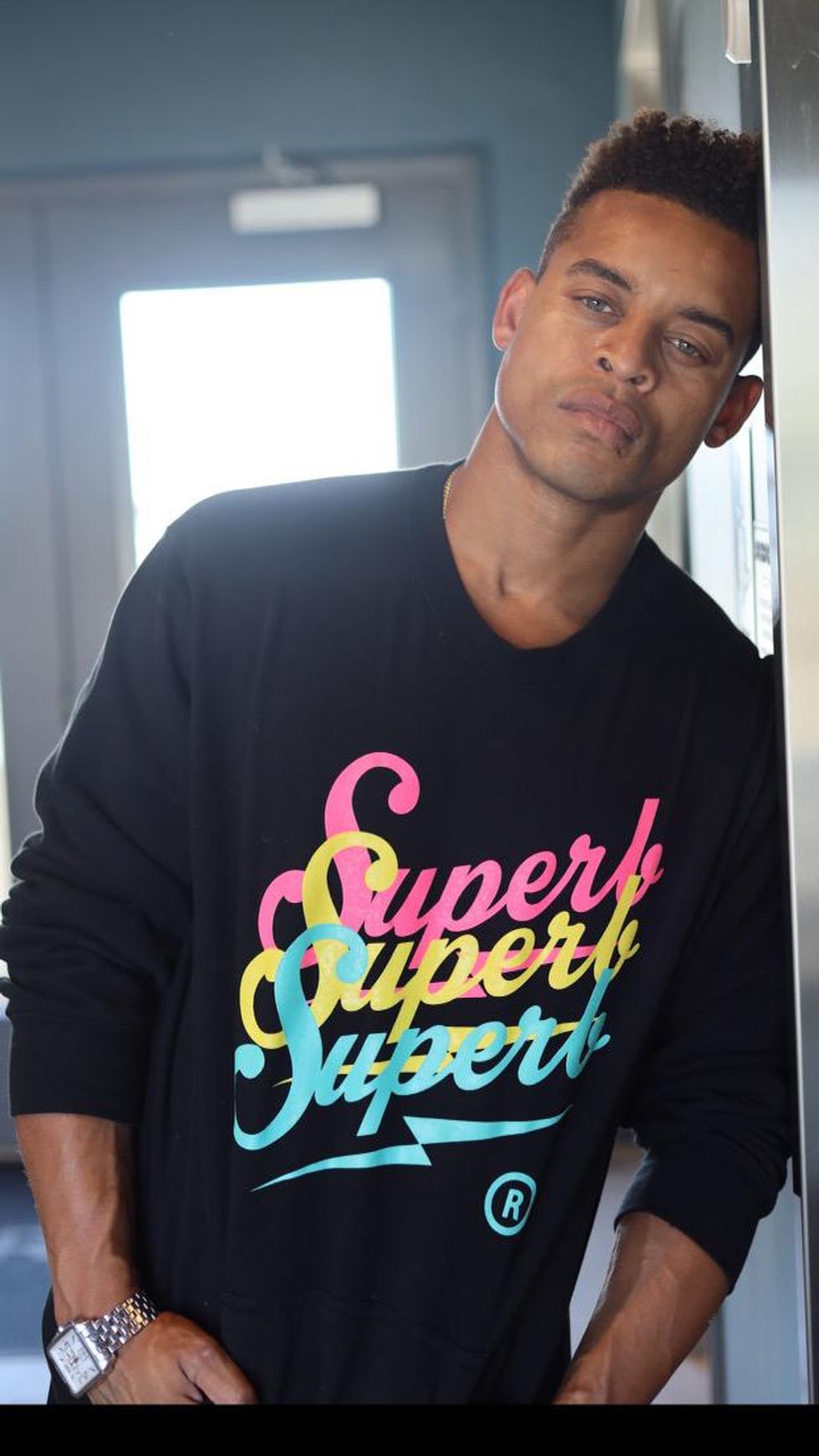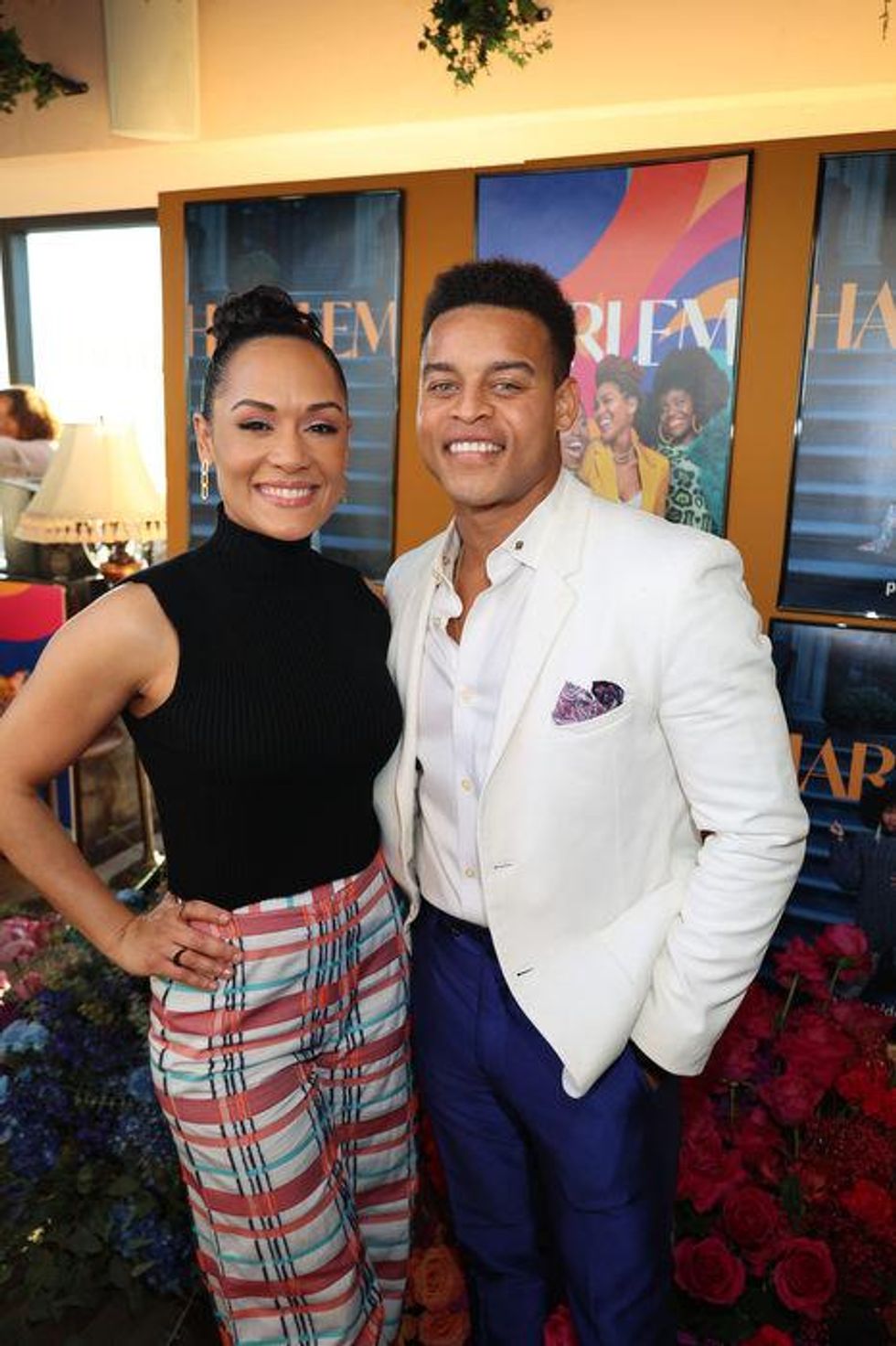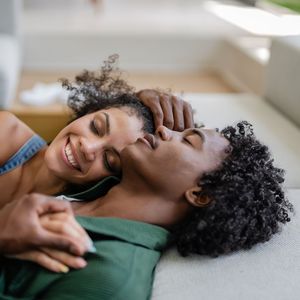
Have you ever had a dating, relationship, or hook-up experience that went so wrong you started questioning yourself? Is there something wrong with me? Did I somehow set the wrong expectation? Whether we want to admit it or not, a lot of us can identify with these feelings. That’s why I’m so happy that shows like Tracy Oliver’s Harlem exist to let us know we’re not alone.
The one-hour dramedy honestly and hilariously encompasses many of the trials and tribulations that the everyday Black millennial deals with. From topics about dating and relationships to questions surrounding one’s career trajectory, Harlem is entertaining, authentic, and extremely relatable. One character that has sparked a lot of healthy dialogue is Shawn. He represents the good guy who we may genuinely like but deviates from the ideal man we have in our mind.
Played by Robert Ri’chard, Shawn has some of the most fun and provocative scenes in the series. No stranger to putting on a show, the actor has been a part of many childhood favorites like Cousin Skeeter and One on One, to more grown-and-sexy projects like Kinky and Chocolate City. During our fun chat, we spoke about his acting journey, views on love and relationships, and why Amazon Prime's Harlem should be added to the xoTribe’s watchlist.
xoNecole: First, let me address what so many of our readers are thinking. Do you realize you were the star of a lot of our fantasies back in the day? How does that feel?
Robert Ri’chard: I don’t think I realize it yet! I really haven’t been hit over the head with the iconic roles and movies I’ve been a part of that have been these big juggernauts. And now, I’m on a new one with Harlem. Everybody’s binging and already asking for season two. I’m like, 'Ask for season seven! You know you want it already (laughs).'
But if anyone knows me, they know I never really watch my stuff. I love what I do but I never have the full validation of what I do because I don’t watch myself on camera. Still, it's definitely a blessing. People come up to me at airports, grocery stores, trains, and everything. I’m always on FaceTime talking to grandmas, wives, husbands, and everything. I love that. I love it.

Andre Harris
Well, you've been acting most of your life. How do you think you've grown as an actor and as a man throughout the years?
I feel like everyone makes a point that I'm stuck in time. I’ve been in the business for like 26, almost 27 years. And everyone’s always like you don’t even look 27! I feel like I’m in this Benjamin Button lane where everyone's growing up fast and I get to stay the same age. But luckily I have two other people that are the same age as me: Meagan [Good] is staying young and beautiful and she’s the lead of our show, and then, obviously, everyone knows KP [Kyla Pratt] and I love each other and we’ve just solidified staying youthful. And now I have a new leading lady, Quinn, played by Grace Byers.
Yes, let's talk about your love interest, Quinn! She had quite a few deal-breakers, and that caused a bit of tension in your characters' relationship. Do you have any personal red flags?
I think my deal-breaker is not being all the way in. I play Shawn, and Shawn is all the way in. He’s got nothing to hide. He’s like, if I fall in love with you, I’m gonna fall in love with you. Drop all the walls, resistance, and second-guessing. If you feel it, let’s do it. I think that’s my one thing, if someone is not all the way in, that’s probably a deal-breaker for me.
But also, as a guy, you have to make the ladies feel safe and vulnerable enough to open up. Look, a woman is gonna be reserved and hold her own. Only as you make her feel safe and comfortable will she open up, blossom, and show you the things she’s protecting. I have two sisters, so I listen to how women think. My dad was always telling me to open the door for a woman, make her laugh, and go get her drinks.
I'm happy you said that because I think a lot of women can sympathize with Quinn's character. Do you feel a connection with Shawn like that, too? What's the difference in how you love or how you're a partner versus your character on the show?
I think Shawn and I are so closely related. A lot of people felt like he was refreshing to see, you know, someone that’s all into one girl. He’s listening, talking to her, and helping with her job. He’s doing what he can to quarterback her life and make sure she’s getting the best out of the stuff she’s pursuing.
And I think for Quinn’s character, she’s out with her girls when she meets him. It’s supposed to be fun and games, he’s dancing for her and everything. Then, she realizes they have a lot in common but she wants to keep her walls up and just have a good time. But he wants to cook for her, wake her up with a kiss, meet her friends, and be a part of her life!

Courtesy of Amazon Prime
You've delved into quite a few provocative roles in your career. Was that intentional? If so, why do you think it's important to showcase those different shades as an actor?
No. I’ve done a lot of drama roles and I’ve played the “buttoned-up guy,” too. I think someone has to be fearless. My producers and writers feel like, ‘We can lean on Robert to do things that other actors might be nervous to do.’ I feel like a sniper in that way, I’m the person that’s gonna shoot that shot and be like a shooting guard. I feel honored that people pick me to show what millennials and Gen Z are going through.
And for me, I’m so engulfed in the world, I’m not even aware that a video camera is shooting. It's almost like Shawn is a real person with a real life, and he's doing what a lot of people in America do—jobs where they take care of their family and do whatever they have to. I represent that.
Finally, what is the biggest lesson you'd like people to gain from the show and your character?
Not only do you have to be fearless, but you have to help and love people through their trauma. Number one is to be gentle but two, to be a hammer, and say, 'Listen, I’ll call you out on your stuff.’
And for the show, in the 21st century, it’s so hard to manage friends, dating, and career. And to have a show on air with bomb music—everybody loves the music (laughs)—happening on the biggest platform in the world, New York, and have these characters in this eco-system being super-honest and transparent and trying to figure it out, it gives everyone at home a chance to be represented. I just want people to see themselves in these characters as they eat popcorn and get through this pandemic.
To find out more about Robert Ri'chard, visit his Instagram.
Featured image by Jamie McCarthy/Getty
This Is How To Keep 'Holiday Season Stress' From Infecting Your Relationship
Hmph. Maybe it’s just me, but it seems like there is something really weird happening in the fall season air (because winter doesn’t officially begin until December 21) that cuddle season is in full swing while break-up season is as well. In fact, did you know that break-ups are so popular during the holiday season that December 11 is deemed Break-Up Day?
The reasons why relationships shift around this time vary; however, I did both roll my eyes and chuckle when I read that a very popular one is because it’s an easy way to get out of getting one’s significant other a Christmas present. SMDH.
Anyway, I personally think that the less shallow folks out here may contemplate calling things “quits” or they at least distance themselves a bit from their partner (and what I’m referring to is serious relationships) due to all of the stress and strain that oftentimes comes with the holidays whether it be financial, familial, due to their tight schedules or something else.
Listen, I would hate for you and your man to miss the fun and happiness of experiencing this time of year, all because you are so overwhelmed or irritated that you can’t really enjoy it. That’s why I have a few practical tips for how to avoid allowing the typical holiday season stress from INFECTING your relationship.
Manage Your Expectations
 Giphy
GiphyUnmanaged expectations. If there is a main reason why the holiday season tends to be so stress-filled for so many people, I’d bet good money that this is the cause. And when you’re in a long-term relationship, expectations can manifest themselves in all sorts of cryptic and/or unexpected ways. You might have relatives who assume that you are going to be with them for Thanksgiving or Christmas when you have other plans in mind. You might be thinking that you are going to spend one amount for presents while your man is thinking something totally different. When it comes to scheduling, your signals may be crossed.
And you know what? To all of these scenarios, this is where clear and consistent communication come in. Don’t assume anything. Don’t dictate anything either. From now until New Year’s, mutually decide to check in once a week, just to make sure that you are both on the same page as it relates to the holidays and what you both are thinking will come along with it. The less blindsided you both feel, the less stressed out you will be. Trust me on this.
Set (and Keep) a Budget
 Giphy
GiphyOkay, so I read that last year, 36 percent of Americans incurred some type of holiday-related debt. Hmph. Last year, there was still some sense of normalcy in this country, chile, so I can only imagine what finances are gonna look like over the next several weeks. That said, since I don’t know a lot of people who don’t find being broke stressful, make sure that you and your bae set a budget and then stick to it this year — no ifs, ands or buts.
Because really, y’all — it doesn’t make sense to deplete savings and/or max out credit cards for a few days of giggles only to be damn near losing your mind because you don’t know how to make ends meet come Dr. Martin Luther King, Jr. Day.
And by the way, this tip doesn’t just speak to things like food and gifts; I also mean travel. If it doesn’t make a ton of sense (or cents) to be all over the place this year — DON’T BE.
Keep Matthew 5:37 at the Forefront
 Giphy
GiphyIf off the top of your head, you don’t know what Matthew 5:37 says, no worries, here ya go: “But let your ‘Yes’ be ‘Yes,’ and your ‘No,’ ‘No.’ For whatever is more than these is from the evil one.” That verse right there? Oh, it’s a boundaries lifesaver! I say that because do you see “maybe” or “I’ll think about it” in there? Nope. LOL. It says that you should tell people “yes” or “no” and leave it at that — and that complements Anne Lamott’s quote, “’No’ is a complete sentence” impeccably well. Yeah, you’ve got to remember that anything beyond a yes or no to a request is privileged information; you don’t owe anyone details or an explanation.
Besides, if you are really honest with yourself, when someone asks you something and you give a “Umm, let me think about it” kind of reply, more times than not, you already know what your answer is going to be — so why not let you both off of the hook? Give your response. Commit to that. And let everyone (including yourself) get on with their lives and schedules.
I promise you that when it comes to those holiday parties, you are pissing more folks off by not RSVP’ing or doing so and not showing up than just saying, “Thank you but not this year” off the rip.
Remember That Your Personal Space Is Privilege Not a Right
 Giphy
GiphyA friend of mine recently bought a new house and invited me over to come see it. He’s a single man with no children, so as I was taking in all of the space that he had, especially as I walked through his finished basement, I joked about relatives coming to live with him. “Hell no” and “absolutely not” were pretty much his immediate responses as he went on to say that some folks even had the nerve to be offended when he told them that he had no intentions on taking DNA in.
Ain’t it wild how people think that your stuff is their right? And yes, that brings me to my next point. Your home is your sanctuary space. If you want to host folks this year — cool. If not, ALSO COOL. Please don’t let folks (family included) guilt you into how they want you to act or even into what they would do if the shoe was on the other foot. You are not them — and as one of my favorite quotes states, “If two people were exactly alike, one of them would be unnecessary.” (A man by the name Larry Dixon said that.)
Hell, my friends? They know that I am good for sending them random things that they need or even want all throughout the year. Coming over to hang out at my pace, though. Uh-uh. Chalk it up to being a card-carrying member of the ambivert club yet I like keeping my living space personal — and I sleep like a baby, each and every night, for feeling that way.
Always remember that your space, your time, your resources, your energy and shoot, yourself period (including your relationship), are all things that are your own. You get to choose how, when and why you want to share them. The holiday season is certainly no exception.
Cultivate Some “You Two Only” Traditions
 Giphy
GiphyIt’s not uncommon for some couples to hit me up after the holiday season to “detox.” Sometimes it’s due to the financial drama (and sometimes trauma) that they experienced. Sometimes it’s because they allowed their relatives (especially in-laws) to get more into their personal business than they should’ve. More than anything, though, it tends to be because they didn’t get enough quality time together and so ended up feeling “disconnected.”
Please don’t let that happen. Listen, I’m not even a holidays kind of woman and yet, I will absolutely sit myself down with some hot chocolate and chocolate chip cookies to enjoy a Hallmark holiday film or two. Aside from the fact that most of them are lighthearted and sweet, I also like that they usually focus on couples loving on each other amidst all of the holiday beauty and ambiance — which is something that all couples should set aside some time to do.
Maybe it’s a vacation. Maybe it’s a staycation. Or maybe it’s my personal favorite, A SEXCATION. Whether it’s for a few days, the weekend or even overnight — don’t you let the holidays go by without setting aside time for you and your man to celebrate one another. Don’t you dare (check out “Are You Ready To Have Some Very Merry 'Christmas Sex'?”).
GET. SOME. REST.
 Giphy
GiphyI once read that 8 out of 10 people get stressed out over the holidays and 3 out of 10 lose sleep during to it — and when you’re stress-filled and sleep-deprived, that can absolutely lead to hypersensitivity, making mountains out of molehills and even not being in the mood for sex.
Your relationship can’t afford to go through any of this, so definitely make sure to prioritize rest. I don’t care how unrealistic it might seem during this time, sleep should never be seen as a luxury; it will always and forever be a great necessity.
That said, try to get no less than six hours of shut-eye in (check out “6 Fascinating Ways Sex And Sleep Definitely Go Hand In Hand”) and even ask your bae to take a nap with you sometimes (check out “Wanna Have Some Next-Level Sex? Take A Nap, Sis.”). Not only will sleep help to restore your mind, body and spirit but, when it’s with your partner, it’s an act of intimacy that can make you both feel super connected, even in the midst of what might feel like chaos.
___
Holiday season stress is real. Still, never give it the permission or power to throw your relationship off. Put you and your man first and let the holidays be what they are gonna be, chile.
Let’s make things inbox official! Sign up for the xoNecole newsletter for love, wellness, career, and exclusive content delivered straight to your inbox.
Featured image by Shutterstock
Dreaming Of A White Christmas? These 7 Winter Wonderland Destinations Are Perfect For The Holidays
While most people opt for a tropical vacation during the winter months, there are still many people who want to fulfill their winter wonderland fantasies, which are more than likely centered on watching snow by the fireplace while sipping some hot cocoa.
With Thanksgiving vastly approaching and Christmas a little under a month away, there is still time to ditch the traditional Christmas home to visit family or friends.
Whether you’re looking to put a new stamp on your passport and keep things domestic with a destination in the States, xoNecole has you covered with a few hotspots for those itching to go somewhere cold (but with cozy vibes) this holiday season.
Aspen, Colorado
Our Christmas queen, Mariah Carey, has been taking an annual trip to this snowy destination since 1997, just three years after dropping the track that would make her the unofficial (but official to us) ambassador of the winter holiday.
Aside from being a key vacation spot for one of the culture’s greatest musicians, Aspen also offers travelers access to world-class skiing and snowboarding and four distinct mountains that provide the perfect backdrop for a winter vacation.
Whistler, British Columbia, Canada
Home to the largest ski resort in North America, Whistler Blackcomb, this destination is located in the Coast Mountain Range and is about 75 miles north of Vancouver.
From luxury spas like Scandinave Spa Whistler to Olympic Park, this is another top winter vacation spot that offers a unique experience for people who love snow and the thrill of a good adventure.
Western Massachusetts
Dubbed the place for a magical holiday escape, Springfield, Massachusetts, blends the warmth of small-town charm with unforgettable experiences like Grinchmas at Springfield Museums, Winterlights at Naumkeag in Stockbridge, Historic Deerfield’s Winter Frolic, and many others.
This destination offers something for all ages, and it’s close to home, making it all the more reason to place on your radar for a winter getaway.
Rovaniemi, Finland
If you want to really get into the Christmas spirit, this just may be the place for you. As the official home to Saint Nick himself, Rovaniemi, Finland offers reindeer sleigh rides, the opportunity to stay in a glass igloo, as well as an opportunity to experience the Santa Claus Village.
Lake Tahoe, California/Nevada
Who says that visits to the lake house are only reserved for summer vacation? A winter trip to Lake Tahoe is equipped with stunning lake views and top-notch ski resorts, including Heavenly and Northstar.
Chamonix, France
Sitting at the base of Mont Blanc, Chamonix, France, is known for its skiing and mountaineering. This destination is home to the Aiguille du Midi cable car, the charming Alpine village, and is also close to various other European ski destinations.
Northeastern Pennsylvania
This area of the U.S. state is home to the Poconos Mountains, whose renowned ski resorts include Camelback Mountain, Blue Mountain, and Jack Frost Big Boulder. Whether you’re a ski expert, a beginner, or just there for the vibes, this destination makes for a winter vacation that balances fun adventures and cozy getaways. Additionally, Pennsylvania is home to the Christmas Tree Capital of the world.
Feature image by Shutterstock
Originally published on November 23, 2024









